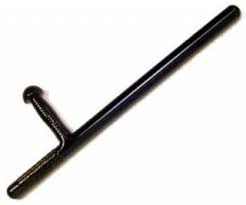记忆方法
1. 谐音“棒疼”。
中文词源
baton 警棍
来自法语。bat, 马鞍,同bast. 可能指赶马的棍子,后指警棍。
英语词源
- baton (n.)
- 1540s, "a staff used as a weapon," from French bâton "stick, walking stick, staff, club, wand," from Old French baston (12c.) "stick, staff, rod," from Late Latin bastum "stout staff," probably of Gaulish origin or else from Greek *baston "support," from bastazein "to lift up, raise, carry." Meaning "staff carried as a symbol of office" is from 1580s; musical sense of "conductor's wand" is from 1841 (from 1839 as a French word in English). Often anglicized 17c.-18c. as batoon.
权威例句
- 1. He once again raised his baton and brought in the brass.
- 他再次举起指挥棒,让铜管乐部加入进来。
- 2. Police in riot gear baton-charged the crowd.
- 暴乱中,警察挥舞着警棍对人群发起冲击。
- 3. They were driven back by a police baton charge.
- 他们被警察用警棍赶了回去.
- 4. The reactionary police made a baton charge on the demonstrating crowd.
- 反动警察用警棍驱散示威的人群.
- 5. The conductor beat time with a baton.
- 指挥用指挥棒打着拍子.

